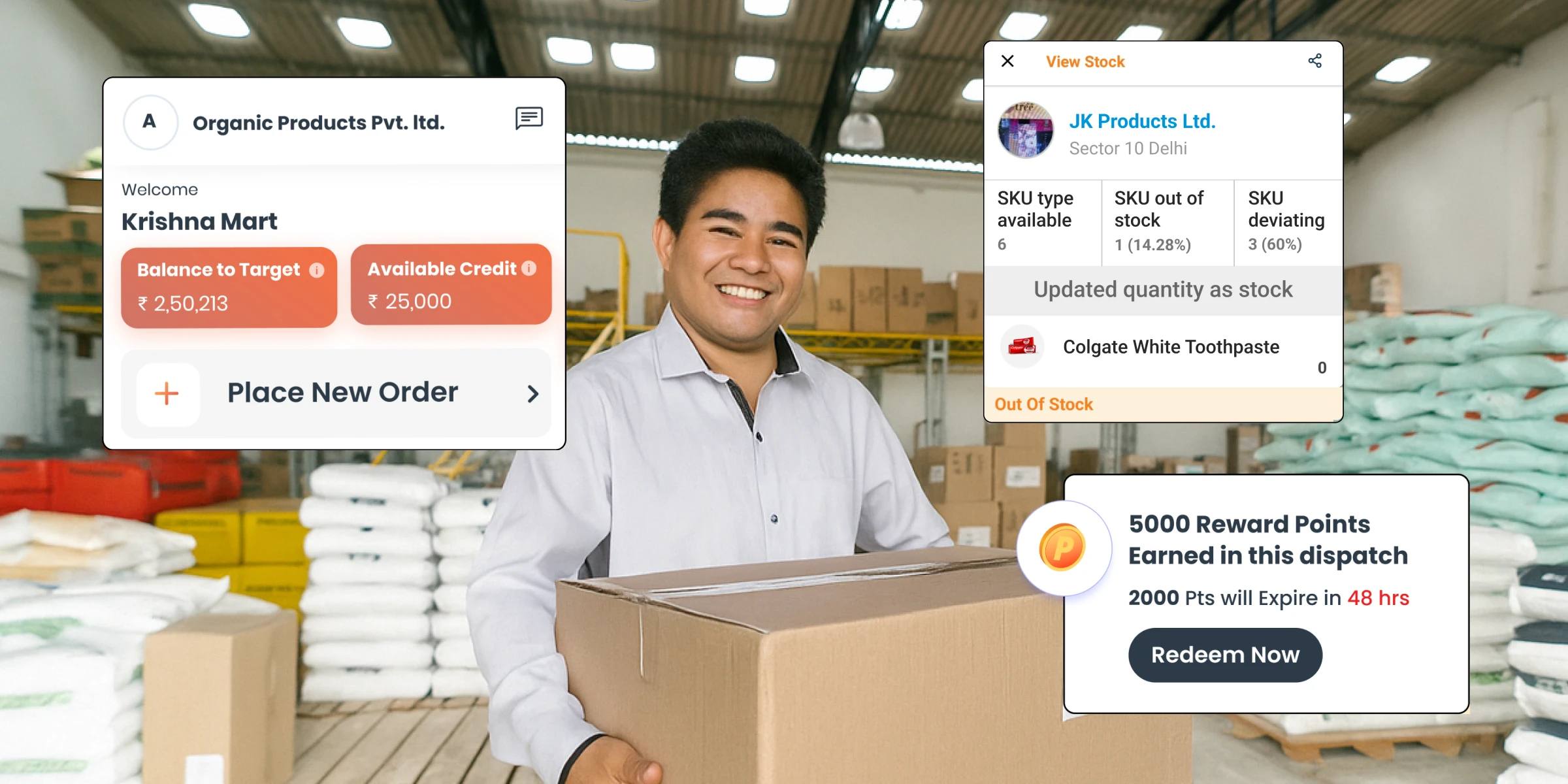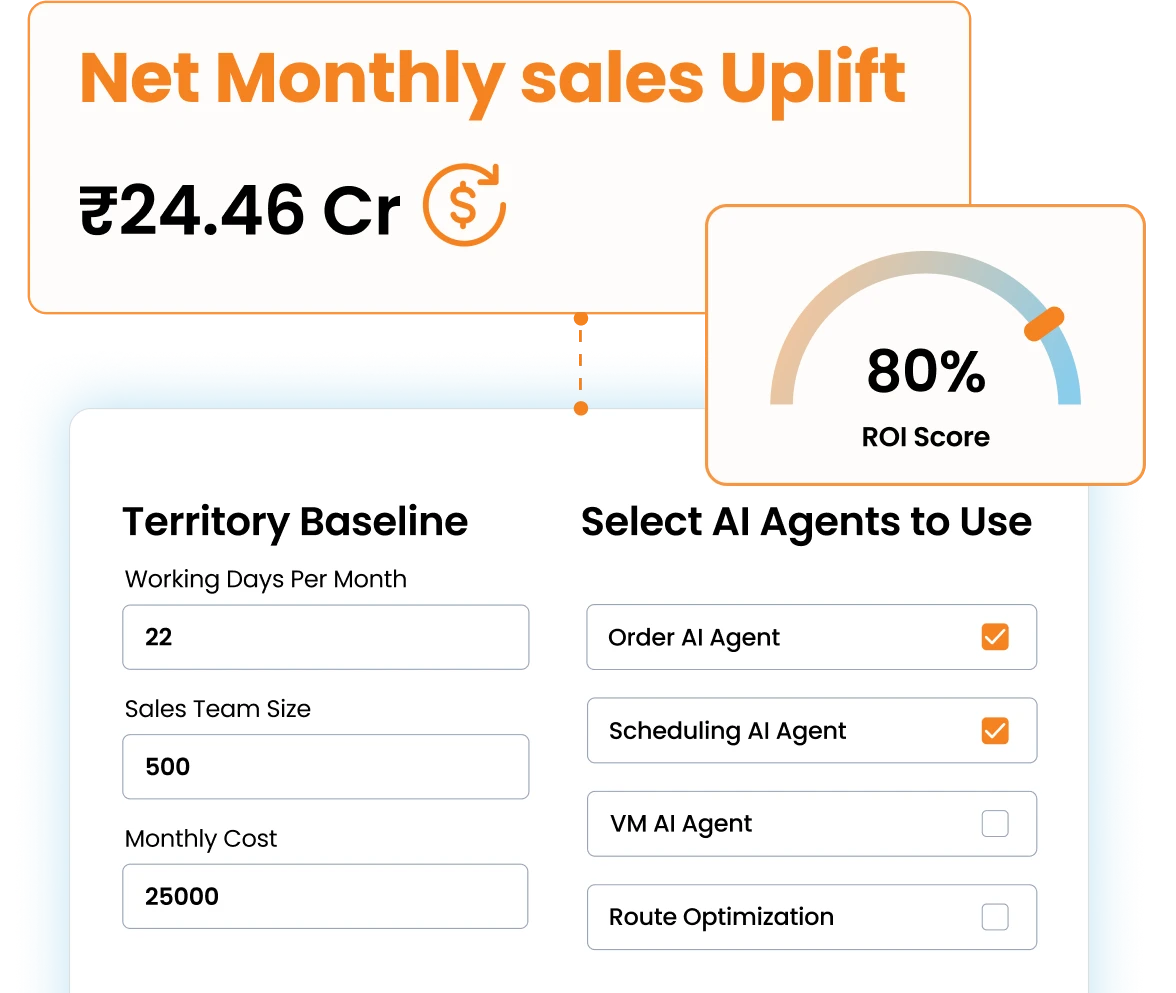The Ultimate Guide to Distributor Management Systems for FMCG Companies

The FMCG supply chain is one of the biggest cost drivers in the industry, making distribution efficiency a critical priority. Here are some key stats:
- Nearly 70% of total operational costs come from the supply chain
- 34% of FMCG supply chains still rely on manual processes
- 25% of FMCG products face stockouts, directly hurting sales and brand reliability
In emerging markets, where FMCG growth is booming, this inefficiency translates into lost revenue, dissatisfied distributors, and gaps for competitors to exploit.
That is why forward-looking FMCG brands are not just investing in FMCG DMS (Distributor Management System) software, but rethinking how they manage distribution and build relationships.
However, deploying technology alone is not enough. Adoption is often the biggest hurdle, as many distributors resist switching or find tools misaligned with their workflows.
In this blog, you will learn what an FMCG DMS is, why it matters in 2025, its key features and benefits, the common challenges in adoption, and how leading solutions address them.
What Does an FMCG Distributor Management System Do?
A Distributor Management Software enables FMCG brands to digitize and automate their distribution network. It handles everything from:
- Order placement to fulfillment
- Inventory visibility and stock management
- Trade schemes, claims, and credit notes
- Secondary sales tracking
- Payment reconciliation and account statements
In simple terms, an FMCG DMS bridges the gap between your sales teams, distributors, and retailers, ensuring smooth flow of goods, money, and data.
What Challenges Do FMCG Companies Face Without a DMS?
- Distributor Complexity: Managing multiple brands and categories makes real-time data capture crucial, yet difficult.
- Fierce Competition: Store-level execution and timely replenishment are hard to control without digital systems.
- Distributor Loyalty: Without empowerment, distributors are less motivated to prioritize your brand.
- Operational Inefficiencies: Manual order-to-cash processes increase errors, pilferage, and delays.
Challenges in DMS Adoption
Even with a Distributor Management Software, many FMCG brands struggle with adoption:
- Distributors resist multiple systems: One DMS per brand is not practical.
- Preference for Tally or legacy systems: Distributors want to avoid extra manpower or duplication of effort.
- Low adoption = incomplete secondary sales visibility.
With vs. Without an FMCG DMS: Key Differences
|
Aspect |
Without Distributor Management Software |
With Distributor Management Software |
|
Distributor Management |
Manual, fragmented tracking |
Centralized, digital visibility |
|
Inventory Control |
High risk of stockouts/overstocking |
Real-time stock monitoring and replenishment |
|
Claims & Schemes |
Delays, disputes, and lack of transparency |
Automated processing and faster settlements |
|
Secondary Sales Visibility |
Dependent on distributor reporting |
Real-time, accurate, and consistent data |
|
Distributor Experience |
Frustrating, low motivation |
Empowered with self-ordering, rewards, and transparency |
|
Operational Costs |
Higher due to inefficiencies and errors |
Lower through automation and reduced leakage |
|
Sales Visibility |
Limited view, mostly secondary data only |
Comprehensive visibility on both primary and secondary sales |
Key Features of BeatRoute’s Distributor Management System Software
BeatRoute’s FMCG DMS goes beyond generic solutions by addressing the biggest roadblocks to adoption. Its design ensures that every distributor is covered, whether it is remote distributors using the Hybrid DMS, multi-brand distributors using Tally or other plugins, or single-brand distributors using a full-fledged DMS. This flexibility makes it easier for brands to achieve complete distributor coverage and ensures smoother adoption across the network.
Here are the key features and how BeatRoute helps FMCG companies strengthen distribution:
1. DMS for Every Distributor
- Designed to cover all distributor types including remote, multi-brand, and single-brand
- Enable remote distributors to self-order directly from their mobile or WhatsApp
- Provide visibility into goals, milestones, and rewards
- Simplify claims management and status tracking
2. Secondary Sales Visibility
- Capture real-time secondary sales data without additional effort from distributors
- Integrate seamlessly with Tally and other third-party tools for multi-brand distributors
- Provide actionable insights into scheme utilization and store-level sales
3. Primary Sales Tracking
-
Enable real-time visibility of primary orders and dispatches
-
Help distributors self-order via mobile or WhatsApp
-
Provide brands with clear insights into order status and distributor-level performance
4. Inventory & Stock Management
- Give brands a live view of distributor stock positions
- Balance demand and supply to prevent stockouts or overstocking
- Support creation of trade schemes linked to actual inventory levels
5. Payment & Credit Transparency
- Offer clear account statements accessible to both brands and distributors
- Monitor credit limits in real time to ensure timely payments
- Automate debit/credit note reconciliation to avoid disputes
6. Scheme & Claim Management
- Automate scheme allocation and validation for distributors
- Speed up claim settlements to build stronger trust
- Provide transparency on rewards, schemes, and benefits earned
7. Integration with SFA
- Connect distributor operations with field execution in one platform
- Flow orders seamlessly from Sales Force Automation to DMS
- Provide a unified view of sales execution, distributor performance, and store impact
Benefits of BeatRoute’s FMCG DMS for Companies and Distributors
Benefits for FMCG Companies
- Improved visibility into secondary sales: BeatRoute’s Distributor Management Software gives brands a real-time, accurate view of both primary and secondary sales data.
- Accurate forecasting and stock management: With access to live distributor inventory and sales movement, brands can forecast demand better, prevent stockouts or overstocking, and align trade promotions with actual consumption trends.
- Stronger distributor relationships: By simplifying claims, payments, and scheme management, and providing transparent goals and rewards, BeatRoute’s DMS helps foster trust and loyalty among distributors, motivating them to prioritize your brand.
- Reduced revenue leakages: Automation across order-to-cash processes minimizes pilferage, reduces human error, and ensures that promotions and claims are settled fairly and quickly.
Benefits for Distributors
- Easier order placement and claim settlement: Distributors can place orders directly via mobile or WhatsApp and track claims in real time, making their day-to-day operations smoother.
- Transparent goals and rewards visibility: With BeatRoute, distributors have access to their sales goals, performance milestones, and accumulated rewards, ensuring clarity and motivation to grow business with your brand.
- Less manual reporting, more business focus: By integrating with Tally and other accounting tools, BeatRoute removes duplication of data entry, reducing admin work and freeing up time for distributors to focus on sales and growth.
Why BeatRoute’s Hybrid Distributor Management System is the Right Choice
Distributor adoption has always been the biggest barrier for FMCG brands when implementing a Distributor Management System Software. BeatRoute solves this with a flexible Hybrid DMS that adapts to every type of distributor, whether it is integrating with Tally for multi-brand distributors, enabling mobile and WhatsApp ordering for remote distributors, or offering a full-scale DMS for single-brand partners.
Book a free demo to see how BeatRoute’s Distributor Management Software not only improves distributor relationships but also creates a collaborative ecosystem across primary and secondary sales.
FAQs
What is an FMCG DMS and why is it important?
An FMCG Distributor Management System digitizes primary and secondary sales, helping brands cut costs, improve supply chain visibility, and respond quickly to market demand.
How is BeatRoute’s Distributor Management Software different from others?
Unlike generic systems, BeatRoute’s Hybrid DMS adapts to every distributor type with Tally integration, WhatsApp ordering, and a full platform for single-brand distributors.
What challenges does BeatRoute’s DMS solve for FMCG brands?
It tackles the core adoption challenge by fitting into existing workflows, eliminating manual duplication, and ensuring accurate sales visibility across all distributors.
How does BeatRoute’s DMS improve distributor relationships?
By making ordering, claims, and rewards transparent and simple, distributors feel empowered, which builds trust and motivates them to prioritize your brand.
Can BeatRoute’s DMS integrate with existing systems?
Yes, it plugs directly into Tally and other accounting tools, letting distributors continue with familiar systems while providing brands with real-time data.
What visibility does BeatRoute’s Distributor Management System provide?
It offers real-time insights into dispatches, claims, stock levels, and secondary sales, allowing brands to respond faster to market changes.
Why is distributor adoption easier with BeatRoute?
Distributors can keep using their existing tools like Tally, place orders via WhatsApp, or access a full-fledged DMS if single-brand, ensuring no workflow disruption.
What’s the first step to adopting BeatRoute’s Distributor Management Software?
Start with a demo or consultation to see how BeatRoute can transform your distribution with real-time visibility and goal-driven execution.
About the Author
-

Surya Panicker is the Head of Content at BeatRoute, where she leads content strategy for India’s goal-driven sales platform. With 9 years in marketing automation and SaaS, Surya specializes in building content that translates complex solutions into actionable business outcomes. Her approach combines data-driven insights with a storytelling mindset, always putting the customer at the center of her narratives. Surya focuses on aligning brand messaging with audience needs to deliver practical results. Outside of work, she enjoys exploring new cuisines, reading fiction, and traveling with her family.
Use Goal-Driven AI to Achieve Retail Sales Uplift, Today!
Join enterprises in 20+ countries that trust BeatRoute, the globally dominant AI platform for sales force automation, field sales, DMS, and eB2B
Latest Insights & Articles
Here are the most impactful articles, platform updates, ebooks and reports for you.


